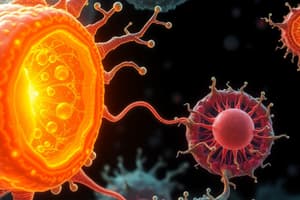Podcast
Questions and Answers
Which part of the cell controls what enters and exits the cell?
Which part of the cell controls what enters and exits the cell?
- Endoplasmic reticulum
- Cell membrane (correct)
- Nucleus
- Mitochondria
What is the focus of cell biology?
What is the focus of cell biology?
- The study of animal cells only
- The study of plant cells only
- The process of photosynthesis in cells
- The structure, function, and behavior of cells (correct)
What is the process of cell division essential for?
What is the process of cell division essential for?
- Creating new cells for growth and development (correct)
- Maintaining cell structure
- Synthesizing proteins in the cell
- Releasing energy in the cell
What are some key concepts in cell biology?
What are some key concepts in cell biology?
How do cells communicate with each other?
How do cells communicate with each other?
What does evolution help us understand?
What does evolution help us understand?
What is the main purpose of communication in the context of the given text?
What is the main purpose of communication in the context of the given text?
Which process leads to the development of new traits and adaptations in species?
Which process leads to the development of new traits and adaptations in species?
What is the cornerstone of modern evolutionary biology according to the text?
What is the cornerstone of modern evolutionary biology according to the text?
Which concept refers to the process by which new species arise from a common ancestor?
Which concept refers to the process by which new species arise from a common ancestor?
What type of adaptations can species develop to survive and reproduce in their environment?
What type of adaptations can species develop to survive and reproduce in their environment?
What drives evolution according to Charles Darwin's theory of evolution by natural selection?
What drives evolution according to Charles Darwin's theory of evolution by natural selection?
Which mechanism can contribute to speciation, involving the physical separation of populations?
Which mechanism can contribute to speciation, involving the physical separation of populations?
What aspect of bio does the text consider fascinating?
What aspect of bio does the text consider fascinating?
What does Charles Darwin's theory of evolution by natural selection posit?
What does Charles Darwin's theory of evolution by natural selection posit?
What do species evolve to help them survive and reproduce in their environment?
What do species evolve to help them survive and reproduce in their environment?
Flashcards are hidden until you start studying
Study Notes
Introduction
Bio, also known as biology, is the scientific study of life as it exists in the world today. It encompasses various branches, including cell biology and evolution, which help us understand the fundamental processes and structures that govern life on Earth. In this article, we will delve into the fascinating world of bio, exploring the subtopics of cell biology and evolution in detail.
Cell Biology
Cell biology is a subdiscipline of biology that focuses on the structure, function, and behavior of cells, the basic unit of life. It is concerned with the organization of cells, their growth, division, and the internal processes that occur within them. Some key concepts in cell biology include:
-
Cell structure: Cells have a unique structure that allows them to carry out various functions. The cell membrane, for example, controls what enters and exits the cell, while the cytoplasm contains various organelles and molecules that help in cellular processes.
-
Cell division: Cells divide to create new cells, a process that is essential for growth and development. The process of cell division involves the separation of chromosomes and the formation of two identical daughter cells.
-
Cell communication: Cells communicate with each other through various mechanisms, such as the release of chemical messengers or direct physical contact. This communication is crucial for coordinating cellular activities and maintaining the health of the organism.
Evolution
Evolution is the process by which species change over time through natural selection. It is driven by genetic variation and the survival of the fittest, leading to the development of new traits and adaptations. Some key concepts in evolution include:
-
Darwin's theory of evolution: Charles Darwin's theory of evolution by natural selection posits that species evolve over time through a process of adaptation to their environment. This theory has been supported by numerous scientific studies and has become the cornerstone of modern evolutionary biology.
-
Adaptation: Species evolve adaptations that help them survive and reproduce in their environment. These adaptations can be physical, such as the development of camouflage in some animals, or behavioral, such as the development of social structures in some insects.
-
Speciation: Speciation is the process by which new species arise from a common ancestor. This can occur through various mechanisms, including geographic isolation, hybridization, and genetic drift.
Conclusion
Bio is a fascinating field that explores the structure, function, and evolution of life on Earth. By studying cell biology and evolution, we can gain a deeper understanding of the processes that govern life and the incredible diversity of species that inhabit our planet. As we continue to uncover the mysteries of the natural world, our knowledge of bio will undoubtedly continue to grow and evolve.
Studying That Suits You
Use AI to generate personalized quizzes and flashcards to suit your learning preferences.




